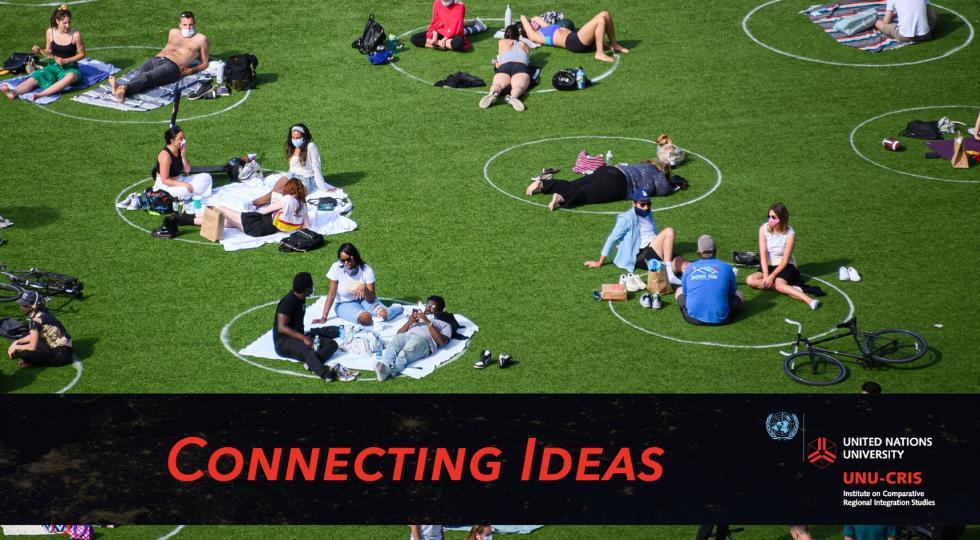The Challenge of COVID-19 and the Need for Meaningful Inclusion


Orsolya Gulyás
PhD Researcher, Vrije Universiteit Brussel

Trisha Meyer
Professorial Fellow, UNU-CRIS

Diāna Potjomkina
PhD Fellow, UNU-CRIS

Jamal Shahin
Professorial Fellow, UNU-CRIS
All co-authors are affiliated with the GREMLIN Project, managed by UNU-CRIS and financially supported by the Vrije Universiteit Brussel
12 August 2020 | #20.28 | The views expressed in this post are those of the author and may not reflect those of UNU-CRIS.
The rapid spread of COVID-19 in German slaughterhouses has been likened to Fukushima by the German labour minister Heil. Along with the disproportionate number of deaths among African Americans in the US, and major apparel brands cancelling orders — and payments – to workers in developing countries, this incident shows how the COVID-19 crisis dramatically exacerbates existing inequalities.
The concept of crisis is not new to most liberal democracies, but a tangible crisis such as COVID-19 really brings home the imperative to think about how we deal with the needs of society as a whole in our democratic systems. We have witnessed governments struggling to keep the balance between economic welfare with health and social welfare. COVID-19, however, suddenly showed us that policymaking based more on genuine inclusion, and less on economics, is valuable, possible, and a choice we can actively make. A society framed as genuinely inclusive may actually lead to a different type of economics. This is not beyond the realms of the possible: the current dominant economic system grew out of the ashes of a different type of crisis – the Second World War – and COVID-19 has also disrupted our world rather fundamentally, and has arisen at a time when change to the international liberal order may not only be possible, but probable.

If COVID-19 can provide us with one lesson, it is that the democratic values that we share can be transformed, even very radically and very quickly: the viral nature of the health crisis basically forced our institutions to prioritise public health over the economy (to varying degrees across different countries). During this crisis, we were all part of the problem and were all included in providing the solution to COVID-19 in a radically direct way. COVID-19 has given each of us, as potential vectors of the virus, the need to think about what we hold dear in our democratic systems: participation and inclusion, expertise and transparency, legitimacy and efficiency to name but a few of the themes that have been raised in light of COVID-19. We see the fallout from the pandemic as an opportunity to bring forth a debate on these “latent problems”, by discussing alternative strategies for developing our democracies, espousing a genuinely inclusive, and more humane, politics. Without such the acknowledgement of the underlying issues brought to the fore by the consequences of the virus, the risk to our democratic systems is real, as others have argued. Such a genuinely inclusive politics is rooted in political and societal actors mutually recognising each other as equals, speaking with and listening to each other. Currently, inclusion is often formally and institutionally obligatory, but not ‘genuine’. Yet genuine inclusion, for us, means open-ended dialogue which can lead to better solutions for everyone, including underprivileged groups – poor workers as well as large companies
Towards meaningful dialogue
Yet if everything was so simple, we would collectively be in a much better place already. Multistakeholder solutions have been tried and tested in various policy fields but have often come up short on inclusion. What is often missing is meaningful dialogue that, in the spirit of genuine inclusion, would encourage and engage not only the bare minimum of influential interest groups but rather different actors in society, including marginalised and under-resourced groups. This entails a complete reframing of our societal expectations and interactions. Inclusion becomes more than just about ticking the box of stakeholder engagement, but about ensuring that the dialogue between different stakeholders actually contributes to policy development.
Genuine inclusion is a multi-step process. You begin with proactively reaching out to diverse groups, make sure they are not stymied during the discussions, and that policymakers are accountable for acting on these suggestions. This means that our understandings of “representativeness", our approach to stakeholder recruitment, modes of consultation and the usually highly competitive allocation of resources to civil society need to be fundamentally revised to allow for inclusion. To return to our example of German slaughterhouse workers, when precisely is their case significant enough to send shockwaves through the whole society?
Getting people to the table is the first step, but the table itself is also crucial. Genuine inclusion is also about the setting in which inclusion takes place; is stakeholder engagement carried out in a ‘talking shop’ or in a space where policy decisions are made? What weight is given to the space for stakeholder engagement: is it advisory or does it have a formalised role in the policy making process?

Furthermore, problem definitions and language play a crucial role. How are problems defined, and by whom? Are stakeholders brought to the table as actors who are supposed to provide contesting and contrasting opinions? In dealing with wicked problems, the definition of the problem can often limit the opportunity for developing a meaningful and sustainable solution.
We need to think about how we conceptualise political inclusion. Currently, formalisation of stakeholder engagement appears to be the norm. However, if simple ‘representation’, or recognition of equality is our goal rather than our starting point, we risk getting stuck in entrenched patterns of thinking about multistakeholder approaches as the ‘powerful’ giving voice to the ‘powerless’. Such thinking does not bring us closer to a genuinely inclusive politics, in fact, it rather sustains the traditional thinking about politics as power and dominance. We should critically review the institutions that claim to provide inclusion into our daily political lives and give priority to co-operation over competition. The best way to start is to pay attention to how we talk about inclusion and start from acknowledging human plurality: we are all equal but not the same. Genuine inclusion helps to defuse tensions and build resilience. In conditions of nearly absolute interdependence, all elements of a system must be situated on the same, or very similar, level in order to minimise potential shocks.
Importantly, inclusive structures – and the language and mentality required to use them properly – aren’t built overnight. But we can start a discussion on what would be institutionally and socially required for genuine inclusion to be the cornerstone of our democratic life. When dealing with wicked global policy problems, be they trade, technology, health or climate, meaningful multistakeholder approaches may be one way to ensure inclusion and justice are incorporated into our decision-making processes.
